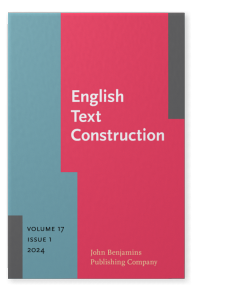English Text Construction
Issues
Volume 17 (2024)
Volume 16 (2023)
Volume 15 (2022)
Volume 14 (2021)
Volume 13 (2020)
Volume 12 (2019)
Volume 11 (2018)
Volume 10 (2017)
Volume 9 (2016)
Volume 8 (2015)
Volume 7 (2014)
Volume 6 (2013)
Volume 5 (2012)
Volume 4 (2011)
Volume 3 (2010)
Volume 2 (2009)
Volume 1 (2008)
Board
Subscription Info
General information about our electronic journals.
Subscription rates
All prices for print + online include postage/handling.
| Online-only | Print + online | ||
|---|---|---|---|
| Volume 18 (2025): 2 issues; ca. 300 pp. | EUR |
EUR |
|
| Volume 17 (2024): 2 issues; ca. 300 pp. | EUR |
EUR |
Individuals may apply for a special online-only subscription rate of EUR
Private subscriptions are for personal use only, and must be pre-paid and ordered directly from the publisher.
Available back-volumes
| Online-only | Print + online | ||
|---|---|---|---|
| Complete backset (Vols. 1‒16; 2008‒2023) |
32 issues; 4,800 pp. |
EUR 2,718.00 | EUR 2,990.00 |
| Volume 16 (2023) | 2 issues; 300 pp. | EUR |
EUR |
| Volumes 13‒15 (2020‒2022) | 2 issues; avg. 300 pp. | EUR |
EUR |
| Volume 12 (2019) | 2 issues; 300 pp. | EUR |
EUR |
| Volume 11 (2018) | 2 issues; 300 pp. | EUR |
EUR |
| Volume 10 (2017) | 2 issues; 300 pp. | EUR |
EUR |
| Volume 9 (2016) | 2 issues; 300 pp. | EUR |
EUR |
| Volume 8 (2015) | 2 issues; 300 pp. | EUR |
EUR |
| Volume 7 (2014) | 2 issues; 300 pp. | EUR |
EUR |
| Volume 6 (2013) | 2 issues; 300 pp. | EUR |
EUR |
| Volumes 1‒5 (2008‒2012) | 2 issues; avg. 300 pp. | EUR |
EUR |
Submission
English Text Construction offers online submission .
Before submitting, please consult the guidelines and the Short Guide to EM for Authors .
If you are not able to submit online, or for any other editorial correspondence, please contact the editors or the editorial assistant via e-mail: Dana.Louagie
Articles under consideration are double-blind peer-reviewed and decisions on all published content are made by the editors.
Ethics
John Benjamins journals are committed to maintaining the highest standards of publication ethics and to supporting ethical research practices.
Authors and reviewers are kindly requested to read this Ethics Statement .
Please also note the guidance on the use of (generative) AI in the statement.
Rights and Permissions
Authors must ensure that they have permission to use any third-party material in their contribution; the permission should include perpetual (not time-limited) world-wide distribution in print and electronic format.
For information on authors' rights, please consult the rights information page.
Open Access
Articles accepted for this journal can be made Open Access through payment of an Article Publication Charge (APC) of EUR 1800 (excl. tax). To arrange this, please contact openaccess
Corresponding authors from institutions with which John Benjamins has a Read & Publish arrangement can publish Open Access without paying a fee. Please consult this list of institutions for up-to-date information on which articles qualify.
For information about permission to post a version of your article online or in an institutional repository ('green' open access or self-archiving), please consult the rights information page.
If the article is not (to be made) Open Access, there is no fee for the author to publish in this journal.
Archiving
John Benjamins Publishing Company has an agreement in place with Portico for the archiving of all its online journals and e-books.
